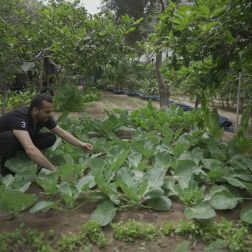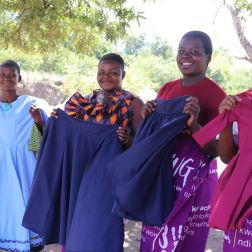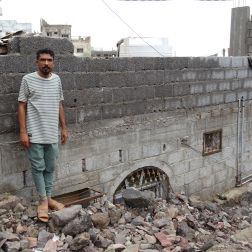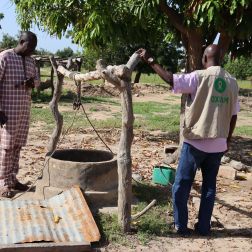- 8 mins read time
- Published: 10th May 2016
“I never thought I’d be a refugee”: From Aleppo to Belfast
“I never thought I’d be a refugee.”
So says Ahmad Alissa, a Syrian refugee now living in Belfast who volunteers at Oxfam’s shop on Botanic Avenue.
Born in Aleppo, Ahmad is from a family of four brothers and five sisters who had a comfortable life thanks to their large olive grove farm and also from a business producing materials for the construction industry.
“We had to leave Syria quickly, it took a short time,” he says. Now Syria is empty.”
“When I first left Syria, I thought I’d be a refugee for a maximum of one year… maybe two years,” Ahmad continues. “But that dream is gone now. Now it seems Belfast and Northern Ireland is my home.
“When I was first a refugee, I had to learn Turkish, so I learnt Turkish. Then I had to learn Greek. Now I hope English is the last language I will have to learn.”
Ahmad was speaking after the screening of a documentary called District Zero at the Belfast Film Festival’s Better World Fringe section organised by the Coalition of Aid and Development Agencies (CADA NI), an umbrella group of large and small charities based in Northern Ireland, working to tackle poverty and its root causes around the world.
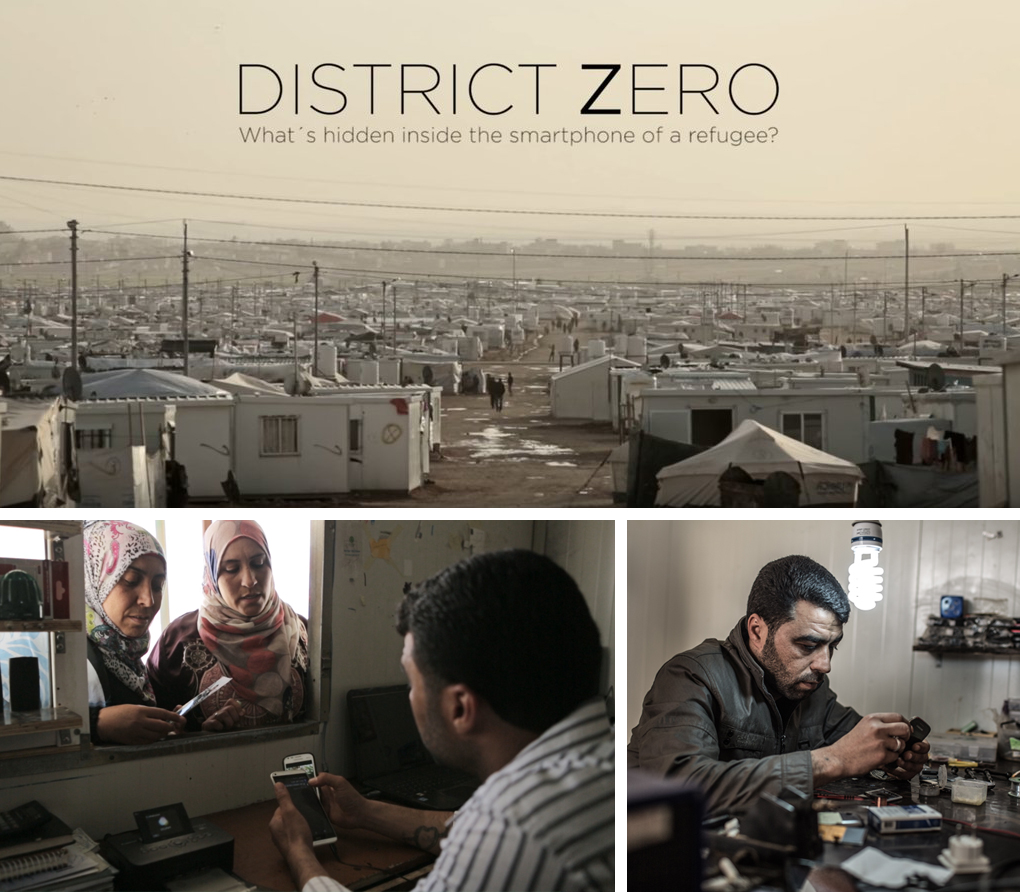
The story of a Syrian refugee who begins a new life in Jordan’s Zaatari camp is the focus of District Zero, a documentary film co-produced by Oxfam and the European Commission. The film focuses on Maamun Al-Wadi – one of almost 60 million refugees and displaced people worldwide – who runs a mobile phone shop in Jordan’s Zaatari camp. Maamun fixes mobile phones and helps fellow refugees print off photos of happier times. Photos by Pablo Tosco/Oxfam
District Zero – a film co-produced by Oxfam and the European Commission – tells the story of Maamun, a Syrian refugee who begins a new life in fixing mobile phones and helps fellow refugees print off photos of happier times.
In almost five years Syria has become the epicentre of a massive humanitarian catastrophe, causing 4.6 million people to flee the country for their lives and 6.8 million more to be displaced internally.
While each refugee’s story is different – for example, unlike the film’s protagonist, Ahmad left Syria before the conflict because of political persecution, and was never in a refugee camp – the documentary does reflect some heart-breaking universal truths behind the refugee experience.
“No-one wants to be a refugee,” says Colm Byrne, who as Oxfam Ireland’s Humanitarian Manager has visited refugee camps in Jordan and Lebanon. “How desperate do you have to be to get into one of those boats looking to cross the Mediterranean? People want to thrive. In Zaatari camp, the people revert to doing what they do at home. They want to move forward, they want to grow.”
Ahmad agreed: “Nobody is happy to leave their home. When I was living in a peaceful Syria, I never imagined I would be a refugee. It’s a reminder that, in the wrong circumstances, anyone could end up as a refugee.
“Many of the people shown in the film come from lives not dissimilar to people I have met here in Northern Ireland – with families and friends, jobs and homes,” added Ahmad.
While Colm agreed with one of the audience members who suggested that the film depicted the best possible refugee experience – with good conditions and economic opportunities – he said: “District Zero shows the heart-breaking reality of refugees in the world. This is as good as it gets for refugees in terms of facilities. You can meet people’s material needs, but in a crisis people want a human connection and a connection to home.
“But this fascinating film does take us into the often invisible world of refugees: a world of chaos and uprootedness. It shows us the complex human realities of people who have been driven to extremes, but who, against many odds, still have hope.”
The film gives a face to the daily drama of millions of people and shows that behind every number and every statistic, there is a story to be told. The title of the film evokes the idea of the lives of Zaatari’s inhabitants being suspended or stuck at a ‘Point Zero’ because of the ongoing war in Syria.
“Conflict has forced people to live in these camps with an uncertain future. They remain stuck in limbo, unsure when they will be able to reunite with their families, or go back to their homeland,” Colm added.
Also on the panel discussion, chaired by blogger Alan Meban, was Monica McWilliams, a Professor of Women's Studies at Ulster University of Ulster and a renowned expert on women in conflict. Monica has been involved in capacity building of Syrian women's groups in Geneva to bring women's voices into the negotiation process.
Monica told the audience: “When in conflict woman are thrown into extraordinary circumstances and they do extraordinary things. The courage, resilience and coping skills shown in the film touches your heart.
“When I saw the baby in the film I wondered, what life it will have in the next four years or the next eight years? Will it have a better life than its mother? Is its father still alive?”
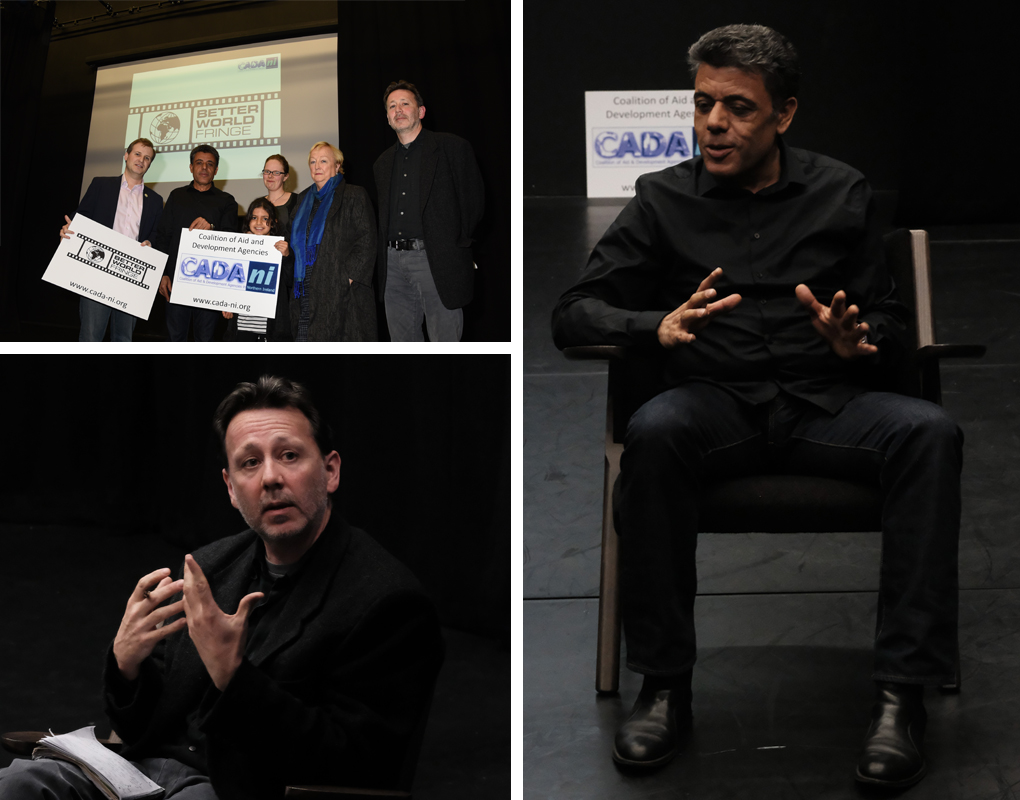
Clockwise from top: From left: Blogger and panel chair Alan Meban; Ahmad Alissa, with his daughter Sara; Oxfam Ireland Campaigns and Advocacy Executive Christine McCartney, co-organiser and Chair of CADA NI; Monica McWilliams, an expert on women in conflict; Oxfam Ireland’s Humanitarian Manager Colm Byrne. Photo by Kevin Doherty. Ahmad Alissa, a Syrian refugee now living in Belfast, spoke as part of the post-screening panel discussion. Photo by Conor Meikleham. Colm Byrne spoke as part of the panel discussion following the film premiere. Photo by Kevin Doherty
To wrap up the event each panellist was asked to recommend a course of action for the international community on Syria and what we here in Ireland, north and south, need to do.
Colm Byrne said: “The concept of humanitarianism is one we hold dear yet we’re not responding to the crisis correctly. Europe’s response to the refugee crisis does not reflect a focus based on humanity, it’s a security response. The deal between the EU and Turkey deal is ill-thought through and illegal, contrary to the spirit of international and humanitarian law.
“Wealthy states only accommodate 10% of refugees. We have to accept our fair share. We need to directly engage with our politicians to find solutions, to physically open our arms. As communities, rights holders and voters we need to put pressure on our leaders to do our fair share.
“And we need to build on our experience of conflict here in Ireland and what we’ve learnt from that.”
Monica McWilliams added: “In the future my grandchildren may ask me, ‘Where were you when they were using chemical weapons in Syria? What did the world stand up and say?’
“So we need to keep working on a humanitarian and political response using the 1325 National Consultative Group implementing the UN Security Council Resolutions on women, peace and security. And we need to keep Syria high up on the media’s agenda.”
Addressing the audience, Ahmad said: “All of you here have seen now what’s happening in Syria. You need to tell your friends and family, everybody must know.”
Phillip Graham is a Media and Communications Executive with Oxfam Ireland.
The District Zero film is part of the ‘EUsaveLIVES – You Save Lives’ campaign by Oxfam and the European Commission’s Humanitarian Aid and Civil Protection department (ECHO), which aims to raise awareness on the lives of almost 60 million refugees and displaced people worldwide.
District Zero trailer
Oxfam & You
If you liked this blog, sign up for our newsletter, called “Oxfam & You&rdquo - a selection of inspirational photos and stories from Oxfam's work around the world will delivered to your inbox once a month.
